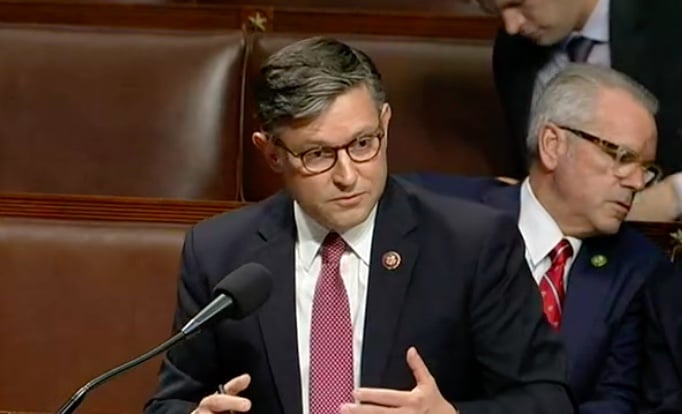House Republicans, under new Speaker Mike Johnson (R-LA), have been moving quickly to try to pass appropriations ahead of a government shutdown deadline that’s now just 2.5 weeks away.
Congress passed a stopgap measure to temporarily fund the government on September 30—the initial deadline to pass a federal budget for fiscal year 2024. That temporary measure runs out on Friday, November 17.
Following the stopgap’s passage, the House got bogged down for three weeks by first ousting then-Speaker Kevin McCarthy (R-CA) and finally electing Johnson—the Republicans’ fourth nominee—on October 25.
Should the Republican-led House pass the 12 appropriations bills needed to keep the government funded, negotiations would move to the Democratic-led Senate, though another stopgap measure will likely be necessary to keep the government running through the end of the year.
Hardline fiscal conservatives have signaled that they’ll allow the new Speaker some wiggle room as he works to get the bills passed, but it’s unclear how long such a grace period would last, or whether Johnson would inevitably fall victim to a concession McCarthy made with those conservatives back in January: allowing just one GOP Representative to make a motion to vacate the Speaker’s chair. Before McCarthy, a motion to vacate required a majority vote from members of the Speaker’s party.
Rep. Max Miller (R-OH) on Monday introduced a resolution to increase the number of Representatives needed to bring a motion to vacate to at least 112 members from either the majority or the minority party. Speaker Johnson has expressed support for raising the threshold, as have some other House Republicans, but no formal vote has been scheduled.
Ahead of his own election to Speaker, Johnson had pitched a “working group” aimed at addressing GOP concerns about an agricultural funding bill for the new fiscal year. That bill failed to pass earlier this year due to moderate Republicans’ objection to language in it targeting the abortion pill mifepristone.
Already, GOP negotiators have written bills to fund levels lower than the budget caps McCarthy agreed to in a deal with President Biden back in May to avoid defaulting on the nation’s debt.
Meanwhile, debate has been heating up over whether to tie military aid to Israel for its war against Hamas to continued military funding for Ukraine for its war against Russia. Defense Secretary Lloyd Austin and Secretary of State Antony Blinken were testifying before the Senate Appropriations Committee on Tuesday to press for Biden’s $105 billion emergency aid request for both countries as well as for other national and global security concerns.
Johnson, who has objected to tying Israeli aid to Ukraine, has signaled he’s at least open to a proposal put forth by Rep. Jim Jordan (R-OH) to “leverage” a stopgap bill that would last until April 30, after which a 1% spending cut would take effect that Jordan believes would give Congress “incentive to do our jobs.”
The Speaker has suggested that some conditions may be placed upon Johnson’s proposed 1% spending cut, such as possibly enacting it across the board rather than having it become effective in April.
Johnson additionally suggested that imposing a January 15 deadline on a 1% spending cut might “incentivize the Senate to do their work,” though he added that he didn’t want to get “too deep in the weeds on the details” as the House is “we’re working in earnest” to pass the appropriations measures.


